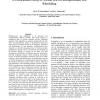Free Online Productivity Tools
i2Speak
i2Symbol
i2OCR
iTex2Img
iWeb2Print
iWeb2Shot
i2Type
iPdf2Split
iPdf2Merge
i2Bopomofo
i2Arabic
i2Style
i2Image
i2PDF
iLatex2Rtf
Sci2ools
140
click to vote
CORR
2010
Springer
2010
Springer
A Performance Study of GA and LSH in Multiprocessor Job Scheduling
Multiprocessor task scheduling is an important and computationally difficult problem. This paper proposes a comparison study of genetic algorithm and list scheduling algorithm. Both algorithms are naturally parallelizable but have heavy data dependencies. Based on experimental results, this paper presents a detailed analysis of the scalability, advantages and disadvantages of each algorithm. Multiprocessors have emerged as a powerful computing means for running real-time applications, especially where a uni-processor system would not be sufficient enough to execute all the tasks. The high performance and reliability of multiprocessors have made them a powerful computing resource. Such computing environment requires an efficient algorithm to determine when and on which processor a given task should execute. In multiprocessor systems, an efficient scheduling of a parallel program onto the processors that minimizes the entire execution time is vital for achieving a high performance. This...
| Added | 09 Dec 2010 |
| Updated | 09 Dec 2010 |
| Type | Journal |
| Year | 2010 |
| Where | CORR |
| Authors | S. R. Vijayalakshmi, G. Padmavathi |
Comments (0)

